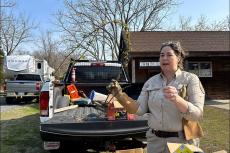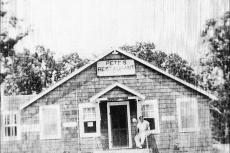The East Hampton Town Board will hold a public hearing on draft legislation regarding the All-Electric Building Act that was recommended by the town’s energy and sustainability advisory committee last year, but it indicated that it would not support all of the committee’s recommendations in the proposed legislation.
At the board’s March 19 work session, Councilwoman Cate Rogers recalled the committee’s 2023 recommendation for a code amendment that would require all appliances including heating and cooling systems, hot water, and cooking stoves in new residential and commercial construction and substantial renovation to be all electric as of Jan. 1, 2025, eliminating their use of fossil fuels. (Substantial renovation is broadly defined in the zoning code as an addition that
increases a structure’s gross floor area by 50 percent or more, or any improvement the cost of which equals or exceeds 50 percent of its market value.)
The proposal is similar, but on an accelerated timetable, to New York State’s requirements for advancing zero-emissions construction as detailed in its 2023-24 budget. That legislation bans fossil-fuel hookups in new buildings seven stories or lower except for large commercial and industrial buildings as of Jan. 1, 2026, and in all other new buildings by Jan. 1, 2029. It exempts emergency backup and standby power, commercial food establishments, laboratories, car washes, laundromats, hospitals, crematoriums, agricultural buildings, and critical infrastructure.
According to the State Department of Environmental Conservation, buildings are the leading source of greenhouse gas emissions, producing 30 percent of economy-wide emissions. The agency recommends electrification of buildings and increasing their energy efficiency.
After a work session at which it was discussed last year, questions arose concerning grid resilience and the impact such legislation would have on local companies that provide fossil fuels. Ms. Rogers said last week that subsequent to that discussion, she received an email from Thomas Falcone, chief executive officer of the Long Island Power Authority, assuring her that the grid is resilient to any new increase in electric use both if the town were to adopt the legislation in 2025 and when the state legislation goes into effect in 2026. (Mr. Falcone announced last week that he will leave that position at the end of May.)
“While I do support a ban for heating and cooling systems, I do not support the recommendation when it comes to appliances,” Ms. Rogers told her colleagues. Requiring electrification of heating and cooling systems in new construction and substantial renovation “creates a more just approach than the statewide rules that are coming down in 2026,” she said. “It does not dictate a current change in building regulations for existing homes or structures whatsoever. There will be no change to the providers for most of the structures and residences in the town, as they are fueled by either gas or fossil fuels, except for folks who have elected to voluntarily make a change. So it doesn’t affect any of the existing housing stock. This gives the community a chance to get a bit ahead of the state.”
Appliances such as electric stoves are at present costly, Ms. Rogers said, “a burden that doesn’t support making the change” until those prices go down. “Where we do get the bang for the buck here in East Hampton is in our heating and cooling systems,” she said.
The Building Department issued 95 permits for new construction in 2023, Ms. Rogers said, and 20 more in the first two months of 2024, representing many more years of fossil fuel emissions. “I can see a great benefit in reducing greenhouse gases with not a considerable impact to the folks who provide the fuels, and not a shock to the grid if we pass this legislation to ban fossil fuels for heating and cooling systems, including hot water systems.”
Implementation of an all-electric policy on new construction and substantial renovation “is a fairly easy win,” said Councilman Tom Flight, adding that “it’s incumbent on us as a board in adopting this to include some public education concepts regarding maintenance. It’s a very different system to what we use with current [heating, ventilation, and air-conditioning systems]. Understanding how users get the longest life and the most efficient use out of these units is critical.”
The federal Environmental Protection Agency and other groups have reported that gas-burning stoves in kitchens may pose a greater risk to the climate and human health than previously thought, including emissions of nitrogen dioxide, which can trigger asthma and other respiratory conditions. Mr. Flight demurred on a ban on fossil fuel-powered appliances, wondering aloud if it is the town board’s place to enact such regulation. “I think there just needs to be more research done . . . before we can adopt something that includes cooking appliances as well,” he said.
Supervisor Kathee Burke-Gonzalez said that she too supports all-electric heating and cooling systems and hot-water heaters starting on Jan. 1, 2025, but does not support the inclusion of appliances. Councilman David Lys did not attend the work session.
Councilman Ian Calder-Piedmonte was noncommittal, telling his colleagues that “I just want to make sure there are no unintended consequences, and think we have to really vet the downside of this.” He has questions as to how the proposed legislation might impact the cost of building affordable housing, he said. “I’m supportive in theory, for sure; I still have questions to be answered and I want to make sure that we’re exercising caution and doing a thorough review of all of the considerations.”
No date was set for a public hearing, but Ms. Burke-Gonzalez said that “we can draft the legislation, take it to public hearing, and hear from the community.”



